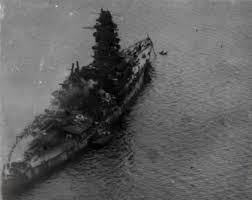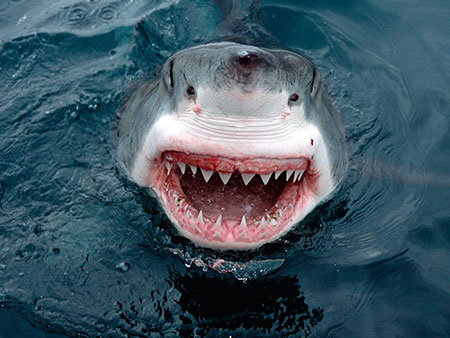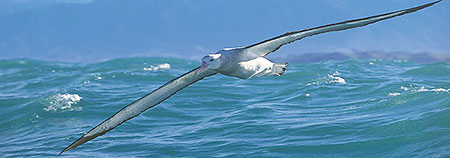Nagato Adrift

We got the tow-wire un-fouled from the turret with great difficulty. Hairless Joe the Bo’sun , his Mate the Lonesome Polecat, the Shipfitter and the First Lieutenant worked out onto the wave-swept blister, clutching at the overhead as swells hissed past. They rigged a chainfall and heaved round. It took more than an hour, since the men could work only during the momentary lull between the sweep off water across the deck. The sun was till an hour high when the wire slipped off the last obstruction and sank. We held our breath at the Sakawa took the strain. The wire snapped out of the water, came taut, and then relaxed.
We had her in tow, just as planned.
Not for long, however. A lumpy blue hill heaved up between the ships. Sakawa reared back like a frightened horse. There was a flash and a bang on the fantail as puffs of rust and fragments of wire flew everywhere. Failure again. We stopped in our tracks, sat down, sunk in apathy.
I roused myself to admire the sunset: gorgeous orange spangles on the azure hills. Something caught in the corner of my eye. The towing wire was not hanging straight down from the bow of the Sakawa, it tended forward and seemed to be jerking a little. Incredible! But we really were still fast to her. When the wire broke, the pelican hook had caught in the port towing check. We lashed it down with many turns of wire rope. Sakawa fell into position astern of us, in tow as planned. As the crew filed off to the galley, spray coming aboard was violet in the fading light. They had worked mightily through a day of danger, frustration and failure, to win. I hope they would get a good night’s sleep.
And then of course it was time for the Number 7 boiler to explode with a great muffled blast and a cloud of black smoke from the stack. We were now left without propulsion and electrical power, which meant no cooking facilities. Their lighting below deck was solely from flashlights, and our food sources were K and C rations. Drinking water was rationed, and despite the labors of the Deck Department, I could only let them could only drink at certain times of the day. The water rose high enough in the ship causing the bilge rats to surface and run freely down the halls. They were particularly active at night, and the “rat race” amid the general stench was unnerving.
In the early morning hours, I was wakened with the order to get out a sea anchor. Why? The engines were about to stop. Call all hands! General Quarters! We didn’t have a sea anchor in the inventory. The electricians rigged floodlights on the forecastles. On an eight-inch hawser longer than the ship, we rigged something like the tail of a boy’s kite. Cargo nets, spars, long festoons of Japanese canvas, and iron bars at intervals so it would sink. It worked. As the engines ground dismally to a stop, the ship’s head held up to the seas. Without the anchor, she would have had the weather on her port quarter, and much more brine than we could have handled would have come aboard, perhaps causing us to founder and sink right there.
When writing out the watch bills in Yokosuka, I took care to reserve the dawn watch, from four to eight, to myself. These are the best hours of the day at sea; the splendor of the night, the miracle of dawn, breakfast, and a cup of hot coffee all in four hours. It was time then to go through the ceremony of relieving the watch. With the ship dying under him, the only thing the Office of the Deck could do was call the Captain who could give orders to the Sakawa which she probably could not obey. She was showing the lights of a vessel being towed. As the first grey of dawn etched in her lines against blackness, it was evident that the weight of the towing wire sinking down into the depths was drawing the ships together. Presently the weight would cause us to collide; and if that situation were allowed to continue, in time both would sink. Without sufficient life-rafts, we would likely drown before help could arrive.
Soon I could make out men working on Sakawa’s forecastle. Fifty or more of them tagging on a line got enough slack to unshackle our wire. They cast it off. In a dying effort, the Sakawa managed a few turns of one screw. That carried her clear and she dropped lifeless into the trough of the sea.
Standing on the bridge as the sun rose, I watched the crew of Nagato climb wearily up into the superstructure and go to sleep there. There was nothing more they could do. The ship wallowed idly to the sea anchor, taking water, but not enough to worry about. The warmth of the sun felt good. At noon, K rations were broken out and the men brought fresh water up to the deck in pails. Down below, the interior spaces seemed vast in the feeble rays of my flashlight. Water was dripping everywhere. That was the only sound. The gloom and the sound of falling water reminded me of being in the limestone caves of Kentucky. Up in the forepeak, dimly lit by shafts of daylight from ports and hatches, one could hear the slap of waves against the bow while the whole structure creaked and groaned. With no power to operate machinery, It sounded exactly like the forepeak of a man o’ war must have sounded from the days of sail.

By later afternoon the resilience of youth brought the men out to amuse themselves on deck. Nor did they lack for subject matter. Sharks came drifting in out of the blue to circle the lifeless hulk. From the foremast we could see them first as olive-green blotches far below the surface. Ever circling, very slowly, they drew into the sunlit transparency about us until every detail of their fins and gills were visible; theirs was the deadly certainty of those who knew they have only to wait. They would take anything that was offered. We could hear the jaws snap as they closed on a loaf of bread. The boys hooked some and shot others, but never got one on deck. They were far too big for that.
The second day an albatross came skimming in close to the water, robbing power from the waves as a surf-boarder does until he has enough to shoot up over the mast and hover there. Just as I expected, someone fired at him. It seems the birds have learned something from the war; anyway, this one ducked and came in a little later to strafe the deck, scoring two hits on personnel. Soon, he was joined by others of his species.
They stayed with us till land-fall, enjoying the free ride. They could not have been omens, could they?
I jotted that question down in the little green notebook I always carried in my hip pocket to ask Captain Whipple about his view about supercargo riding along for free at Quarters later.

Copyright 2015 Vic Socotra
WWW.vicsocotra.com
Twitter: @jayare303
